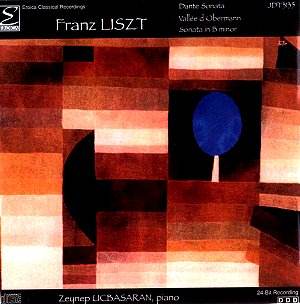
This is the Turkish-born pianist Zeynep
Ucbasaranís third recording for Eroica
Ė I have previously reviewed her first
Liszt collection (JDT3092)
and her coupling of Schubertís late
A major Sonata with the "Wanderer"
Fantasy (JDT3108).
I had some reservations about the first
Liszt album, feeling that, while Ucbasaran
was technically able and had a clear
sense of structure, she did not always
separate out the various strands in
the textures or make her melodic lines
sing enough. Her Schubert showed a considerable
advance with regard to these points,
and the picture began to emerge of an
artist who always puts the composer
first, never drawing attention to herself
with agogic distortions or wayward rubato.
The present Liszt collection seems to
me her best yet. I immediately noticed
many places in the "Dante Sonata"
where melodic strands are separated
from their accompaniments with real
pianistic mastery and there is certainly
no lack of singing tone.
I will concentrate
on "Vallée díObermann"
since it is the shortest piece and what
I have to say goes for the other, longer,
works. Ucbasaran opens with a genuine
"Lento assai", very spacious
and gloomy-sounding. She is fairly successful
in making the repeated chords become
an almost imperceptible pulsation, but
just sometimes they begin to chug. In
the "Più lento" sections
she, like most other interpreters, actually
goes faster. Now, I do realise
that, if the opening is taken at a suitably
broad tempo, these simple chords, unsupported
by the previous repeated eighth-note
movement, can seem impossibly far apart,
and hence the idea has got around that
you play "Più lento"
but with halved note-values. However,
I think it is worth trying to give Liszt
what he actually asked for.
The C major section,
where the sun seems to be breaking through
the dark clouds, is handled with a real
feeling for its burgeoning beauty, but
the following storm brings me to my
most serious reservation over this Liszt.
I really appreciate that Ucbasaran is
trying to give us something monumental,
imposing, and not just a flashy display,
and I am grateful she doesnít attempt
a Horowitz burnout (the Horowitz recording,
which adopts his own doctored text,
is a phenomenal pianistic experience,
to be judged by its own standards rather
than Lisztís); but might she not live
just a little bit more dangerously?
I donít want to call this laid back,
since it has a good deal of weight and
authority, but a notch more of sheer
recklessness might have made it finer
still. Symptomatic is her treatment
of the two phrases marked "precipitato".
She makes nothing much of them, whereas
I was taught (by a Hungarian, Ilonka
Deckers-Küszler, for what itís
worth) that this means you accelerate
ahead of your basic tempo, thus
creating the effect that things are
on the verge of cracking up.
The final E major section
begins with a "Lento" which
is very spacious indeed. I have no issue
with this in itself, but some pianists
have been more successful in giving
the listener the idea that this is the
beginning of something that is going
to build and build and build; the
listener new to the piece might get
the idea from Ucbasaran that it is going
to be a quiet epilogue. At bar 184 the
melodic line, according to the 1976
Hungarian edition which Ucbasaran says
in the booklet she is using, should
be B, C natural and then D sharp,
not D natural as played here. I
know it sounds odd, and this edition
prints the C natural very small, as
though there may be some doubt about
it, and the old Peters edition gives
a C sharp. But Iíve never heard it suggested
that the problem might be resolved by
playing a D sharp. The build-up,
when it arrives, is very imposing but
again, might she not have risked even
more? Iíll have to part company with
her at the end since I am sure that
Lisztís "staccatissimo" dot
over the sforzato E major chord means
that you take the pedal off to leave
several seconds of stunned silence before
breaking in with those final bars which
seem to question all the triumph which
has just been obtained. Pedalling through
the pause (which is not held that long,
either) weakens the effect. I appreciate
that in a concert there is the ghastly
possibility that people will wreck everything
by breaking in with applause, but this
is a recording anyway.
If I have been rather
Beckmesser-ish over this it is because
I feel it is a basically very finely
conceived performance that it would
be worth making better still. Much the
same could be said of the other two
works, though I did feel that in the
Sonata Ucbasaran raises the tension
to higher levels. In any case, this
is certainly a very fine achievement.
Anyone who picks up this disc will be
left in no doubt that Liszt was a composer
of lofty aims and noble inspiration,
a fact which some still question, including,
alas, many who actually play his music.
I feel that Ucbasaran
has still much potential to realise
and look forward to whatever she chooses
to do next. Something tells me she would
be a fine interpreter of Schumann, and
what about the Debussy Preludes?
Christopher Howell

